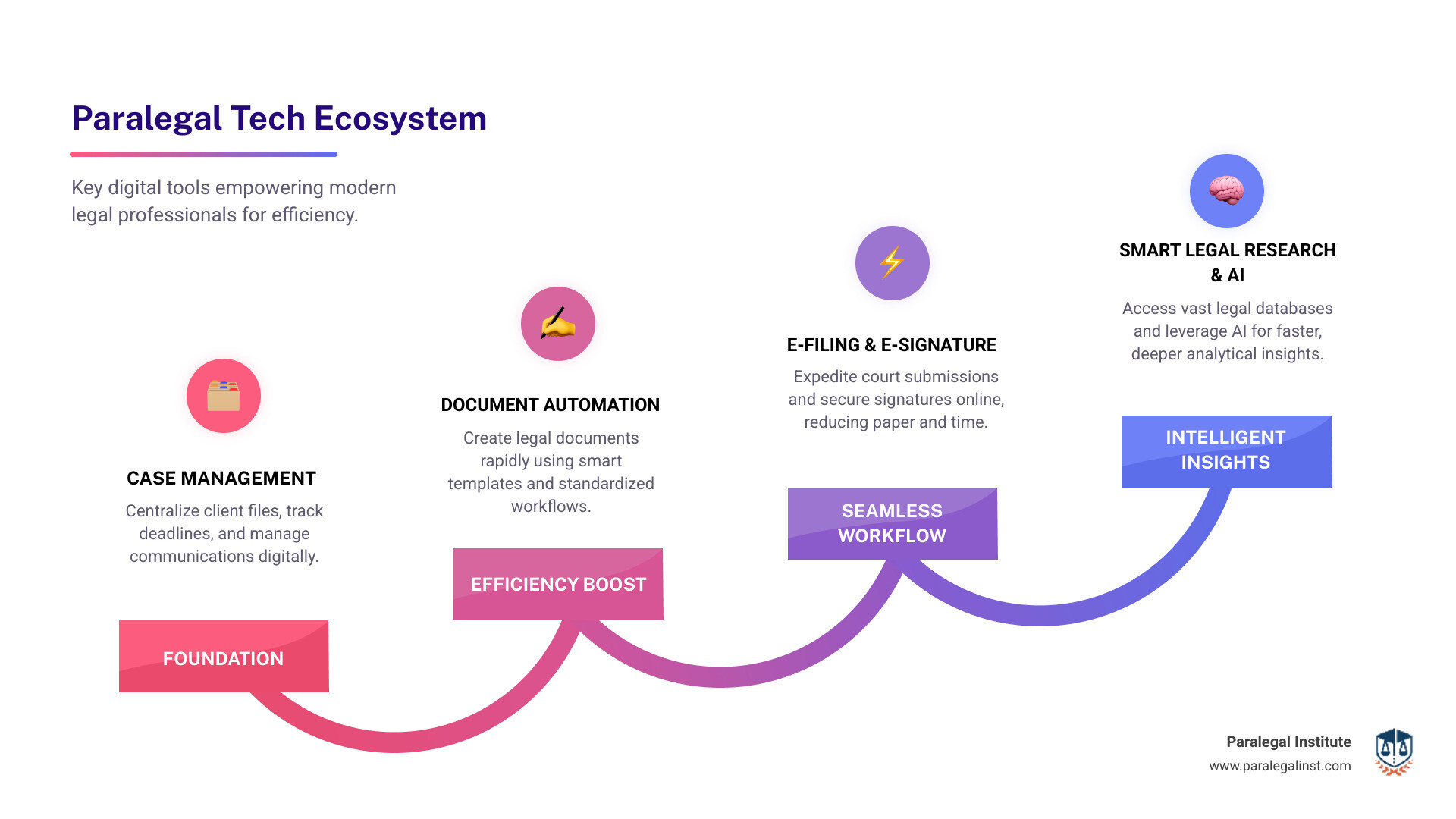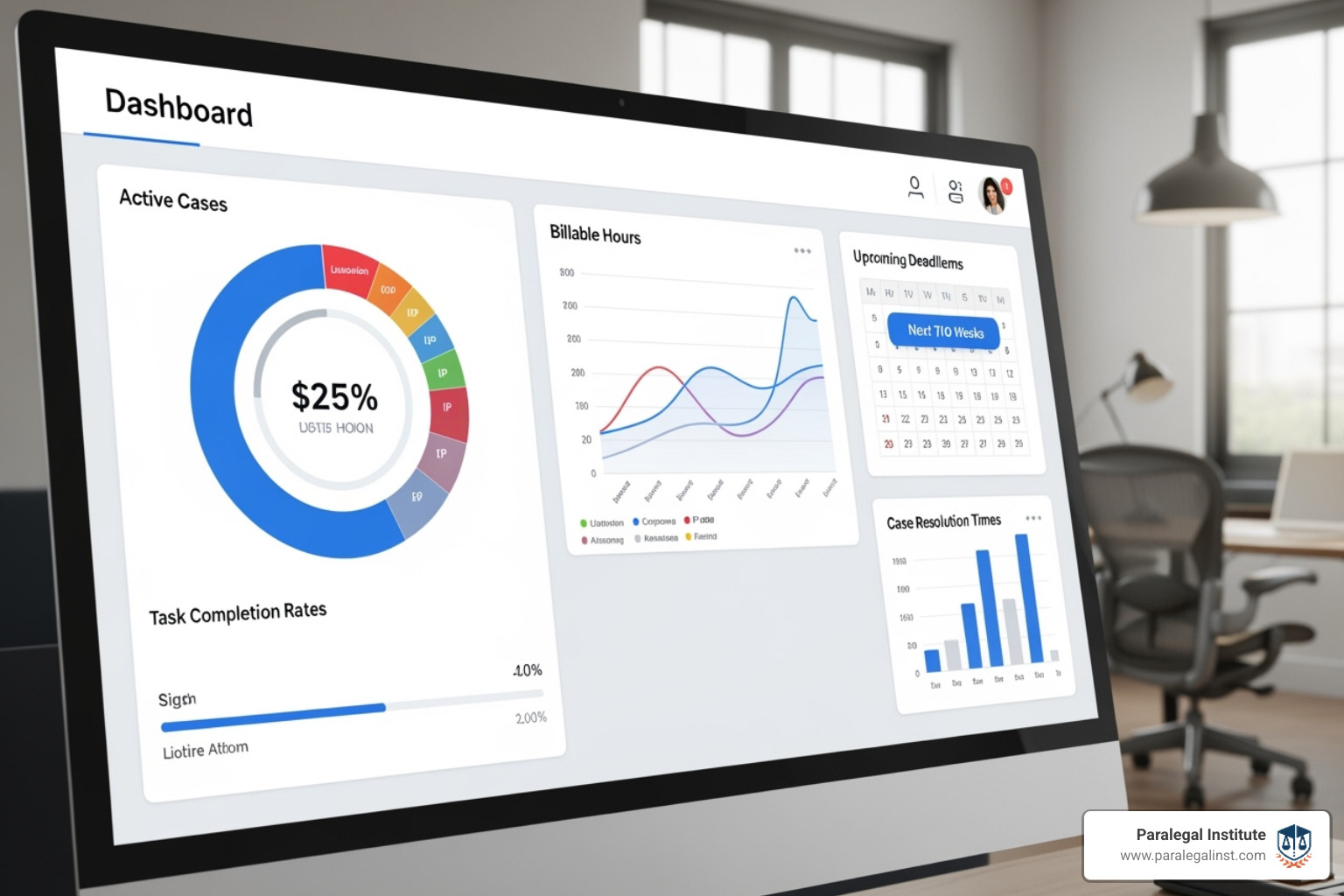Paralegal Power-Up – Mastering Legal Tech Like a Pro
Why Legal Technology for Paralegals Is Essential
Legal technology for paralegals is the backbone of modern legal practice. To stay competitive and deliver exceptional results, today's paralegals must master a suite of digital tools.
Essential Legal Technology Categories:
- Case Management Software- Centralize client files, deadlines, and communications
- Document Automation Tools- Create legal documents in minutes using templates
- E-Filing & E-Signature Platforms- Submit court documents and get signatures digitally
- Legal Research Databases- Access case law and statutes instantly
- Time Tracking & Billing Software- Monitor hours and generate invoices automatically
- Cloud Storage Solutions- Access files securely from anywhere
- AI-Powered Review Tools- Analyze documents and contracts faster
The legal industry is experiencing rapid digital change, with a reported 79% of lawyers now relying on cloud technology. This shift means paralegals who understand legal tech are in high demand.
Modern paralegals manage everything from discovery to automated document creation, handling digital case files and ensuring cybersecurity compliance as paper-heavy workflows fade.
As one legal professional noted: "I have only been using Supio for a few days but it has already transformed the way I work. An outstanding piece of software and incredibly easy to use." This reflects how the right technology can dramatically improve efficiency and job satisfaction.
I'm Matthew Pfau, and I've spent years hiring and training paralegals at my law firm. Through my experience with legal technology for paralegals, I've seen how mastering these tools can accelerate career growth and open new opportunities.

How Technology Is Re-Shaping Everyday Paralegal Work
The role of a paralegal is more dynamic than ever, thanks to legal technology for paralegals. They are no longer just assisting attorneys; Paralegals are managing digital workflows, leveraging automation, and safeguarding sensitive client data.
This evolution is reflected in job growth. The U.S. Bureau of Labor Statistics projects a fantastic 12% growth in paralegal and legal assistant jobs through 2032, much faster than average, creating about 18,900 new job openings annually. This highlights the demand for tech-savvy legal professionals. You can find the Latest research on paralegal demand straight from the Bureau of Labor Statistics.
With more firms offering remote and hybrid work, technology is essential. Cloud-based tools and reliable video conferencing enable seamless collaboration with colleagues and clients, giving firms a competitive edge in attracting and retaining the best talent.
From Paper Trails to Digital Highways
Gone are the days of overflowing file cabinets and endless stacks of paper. Instead of manually sifting through physical documents, we now search vast digital files in seconds. Deadline management, once a manual juggling act, is now streamlined with integrated calendars and automated alerts in case management software, significantly reducing the risk of missed deadlines. Cloud access to documents provides incredible efficiency, allowing you to retrieve files instantly from anywhere with an internet connection.
Risk & Reward: Data Security and Ethics
With this amazing technology comes a great responsibility for data security and protecting client secrets. As paralegals, we are entrusted with highly sensitive information, and keeping it safe is an ethical imperative.
The legal world is a prime target for cyberattacks, with the cost of a data breach often being substantial. We must prioritize data protection by ensuring everything is encrypted, especially for video calls and secure document sharing. It's also vital to stay updated on how to spot and avoid phishing attempts.
Adopting a zero-trust security model, which requires strict verification for all users and continuous monitoring, strengthens defenses. As paralegals, upholding these security protocols is a core part of our ethical duty to maintain client confidentiality and protect the firm's reputation.
Legal Technology for Paralegals: The Essential Toolkit
The modern paralegal's workspace is digital. Success depends on a curated collection of tools that make work faster, more accurate, and more enjoyable. The difference between outdated methods and modern legal tech is like comparing a horse-drawn carriage to a sports car.
Essential tools include case management platforms, document automation tools, e-filing and e-signature systems, and AI-powered research tools. These systems often integrate, creating a seamless and efficient workflow where tasks that once took days now happen in hours.
Case Management Platforms – Your Digital Command Center
Case management platforms are your digital command center, bringing order to complex workloads. They offer matter-tracking for a clear overview of every case, from status to upcoming deadlines. Calendar-sync features consolidate all important dates with automatic reminders, preventing critical errors. Billing-integration automates time tracking and invoicing, saving time and reducing errors. Comprehensive dashboards provide at-a-glance insights into your workload and priorities. For deeper insights, check out our guide on Strategies for Paralegals to Stay Organized.
Document Automation & Management – Draft in Minutes, Not Hours
Document automation tools can create complex legal documents in moments. Template-libraries pull data from your case management system to populate pleadings, contracts, and findy requests, ensuring consistency. Version-control eliminates confusion over multiple drafts, while metadata-scrub tools protect confidentiality by removing hidden data before sharing. The error-reduction is substantial, and the time saved frees you for more complex work. To learn more about how AI is revolutionizing drafting, explore our resource on AI for paralegals.
E-Filing & E-Signature – Goodbye Paper, Hello Speed
E-filing and e-signature technologies have eliminated last-minute courthouse runs and delays in getting signatures. Court-portals allow you to file documents from your desk and track their status in real-time. E-signature platforms like DocuSign let clients sign documents from any device, speeding up transactions. These systems provide secure audit-trails and significantly improve the client-experience. For detailed information, visit the DocuSign research on digital transaction management.
Smart Legal Research & AI Review – Faster, Deeper Insights
AI-powered tools have revolutionized legal research. Platforms like Fastcase offer instant access to legal databases with sophisticated search capabilities. Predictive-analytics can help inform case strategy by analyzing historical data. AI summarization tools quickly extract key points from lengthy documents, while automatic citation-checks ensure your research is current and valid. These tools amplify your research skills, allowing you to cover more ground effectively. To build these skills, consider our Legal Research Skills Training.
Maximizing Efficiency with Key Platforms
Having the right legal technology for paralegals is just the start; maximizing its potential is key. This involves integrating tools into a cohesive system to boost firm efficiency. By mapping workflows, using integration features to connect software, and championing change management, paralegals can help their firms eliminate manual steps and reduce errors.

Boosting Productivity Through Legal Technology for Paralegals
Legal technology is a secret weapon for productivity. Time-tracking software does more than just bill clients; it provides valuable insights into your workflow, helping you identify and fix inefficiencies. Automated alerts ensure you never miss a deadline, while document and email templates save significant time and ensure professional consistency. It's all about working smarter, not harder.
Advocacy & Implementation: Be the Tech Champion
As frontline users, paralegals are ideal advocates for new technology. To be a "tech champion," build a strong business case. Identify ROI-cases by showing how a tool can save time, reduce errors, or improve client satisfaction. Propose small pilot-projects to test software on a limited scale. When speaking with vendors, ask critical vendor-questions about security, integration, and support. Finally, help with policy-updates to ensure new tech aligns with firm rules and ethics.
Cybersecurity Best Practices Every Paralegal Should Know
Cybersecurity is everyone's responsibility. As paralegals handling sensitive data, we must follow best practices when using legal technology for paralegals. Use password-managers for strong, unique passwords and enable Multi-Factor Authentication (MFA) for an extra layer of security. Ensure your firm's cloud systems use encryption-at-rest and in-transit. Know your firm's incident-response plan and regularly review compliance-checklists to maintain data protection rules. Your diligence is key to protecting firm data and client trust.
Building Future-Proof Tech Skills
The legal world is constantly evolving, and paralegals must adapt. Building future-proof skills requires a mindset of continuous learning. Create a personal upskilling path by exploring new technologies through micro-learning —spending small amounts of time on specific tools. Networking with tech-savvy peers provides valuable insights, and making trend-watching a habit will keep you ahead of the curve. Learn how to improve your career prospects with Enhancing Paralegal Career Prospects with Online Education.
Must-Have Digital Competencies for Modern Paralegals
Beyond specific software, modern paralegals need broader digital competencies. Data-analysis skills, like interpreting reports from case management systems, can provide valuable insights for attorneys. Understanding API-thinking —how different software can connect to streamline work—is also beneficial. One of the most exciting new skills is prompt-engineering for AI tools. Learning to write effective commands for AI can open up its full potential for research and drafting, turning it into a powerful assistant. Our Legal Research Guide for Paralegals is an excellent resource.
Staying Updated on Emerging Tools & Trends
Staying current with legal technology for paralegals is essential. Subscribe to industry newsletters and blogs to keep up with the latest news. Attend webinars, often free, to see new tools in action. Get involved with professional associations to access events and networking opportunities. Finally, seek mentorship from experienced professionals for personalized advice on which tools are making a real impact.
The Road Ahead: AI, Automation & the Paralegal Job Market
What is the future of paralegal work with AI and automation? The good news is that legal technology for paralegals is here to augment your role, not replace it. The job market is strong, with the U.S. Bureau of Labor Statistics projecting around 18,900 new job openings annually. This growth is often driven by technology, as efficient firms need skilled paralegals to manage their systems.
Technology is a partner, not a competitor. AI cannot replicate the human-touch —your critical thinking, judgment, and communication skills. Your role will evolve to be more strategic, opening doors for greater career-mobility and focusing on tasks like ensuring ethical-AI-use. It's an exciting time to be a paralegal!
Will AI Replace Paralegals or Boost Them?
This is the big question, and the answer is clear: AI will boost paralegals, not replace them! In fact, much of the latest research agrees, helping to "Squash Concerns About Paralegal Job Security."
AI excels at task-automation, handling repetitive jobs like document review at superhuman speeds. This frees you from tedious work. However, AI has a significant judgment-gap. It cannot provide client advice, strategize a complex case, or understand human emotions. This is where your collaboration with AI is key. You use AI for data processing and apply your legal knowledge and critical thinking to interpret the results. AI becomes your assistant, allowing you to focus on higher-value work.
Leveraging Tech to Attract & Retain Top Paralegal Talent
For law firms, embracing advanced legal technology for paralegals is a smart strategy to attract and retain top talent. A modern-stack of legal tech signals a commitment to innovation and efficiency, creating an attractive work environment with higher job satisfaction. Technology also enables flex-work options, which are crucial for work-life balance. Firms that offer continuous-learning opportunities in legal tech show they are invested in their employees' growth, making them a desirable employer. As research points out, firms can "use legal technology to hire the best paralegals at your firm" – a powerful advantage in today's competitive landscape.
Frequently Asked Questions about Legal Technology for Paralegals
Got questions about diving into legal tech? You're not alone! Here, we address some of the most common questions we hear from aspiring and practicing paralegals.
What tech skills should I prioritize first?
If you're just starting your journey into legal technology for paralegals, prioritize foundational tools. Start with case management software, your digital command center for organizing cases and deadlines. Next, master document automation tools to save time and reduce errors. Proficiency in legal research databases is also a core skill. Finally, get comfortable with cloud-based storage and basic cybersecurity practices. These skills will prepare you for more advanced tools.
How can I convince my firm to invest in new software?
To get your firm to invest in new legal technology for paralegals, build a compelling business case. Identify a specific problem the software solves, like manual deadline tracking or drafting errors. Research solutions and gather data or case studies showing a clear return on investment (ROI) in time saved or errors reduced. Propose a small pilot program to demonstrate the software's value before a firm-wide commitment. Frame the investment as a way to boost efficiency and gain a competitive edge.
Is cloud storage really secure enough for client files?
Yes, when implemented correctly, cloud storage is highly secure for client files—often more so than on-premise solutions. Reputable providers invest heavily in advanced encryption, physical security, and disaster recovery. The widespread adoption of cloud technology in the legal field, with a reported 79% of lawyers now relying on cloud technology, speaks to its trustworthiness. The key is choosing a secure provider and following best practices like using strong, unique passwords and enabling multi-factor authentication (MFA). Your vigilance is crucial for upholding your ethical obligations for client confidentiality.
Conclusion
As we wrap up our journey through the exciting world of legal technology for paralegals, it's clear that the legal landscape is buzzing with innovation. These tools are making us more efficient, accurate, and strategic. This isn't about technology taking over; it's about augmenting your unique judgment and skills. By embracing these tools, you become an indispensable asset, ready for a future where your contributions are amplified.
If you're feeling inspired and ready to step into this future-ready role, building a strong foundation in legal practice and technology is your next big step. Here at Paralegal Institute, we're all about giving you the practical skills you need to succeed in the paralegal field and excel in this tech-driven era. The future of legal work is here, and with the right knowledge and tools, you won't just keep up – you'll truly excel. To learn more about how you can power up your career, explore More info about top resources available through Paralegal Institute.










